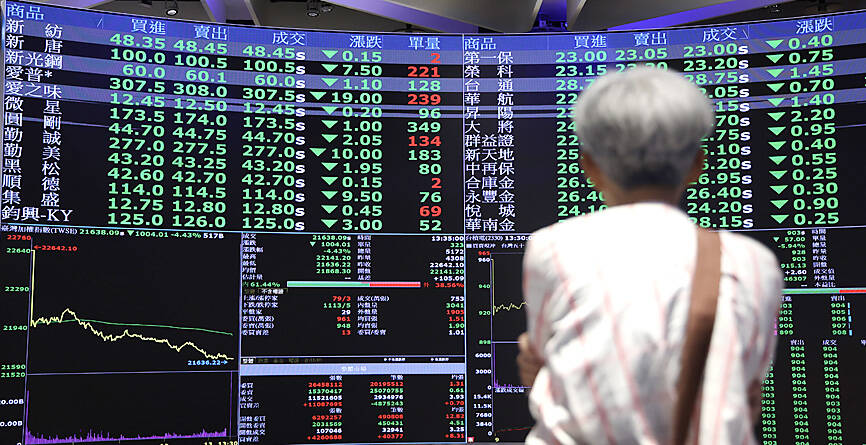The TAIEX yesterday slumped 4.43 percent, or 1,004.01 points, to close at 21,638.09 as investors took cues from Wall Street and dumped tech shares amid unease over signs of economic weakness in the US, analysts said.
Turnover reached NT$517.183 billion (US$15.76 billion) and foreign institutional players slashed positions by NT$96.66 billion after US technology giants Intel Corp and Amazon.com Inc posted disappointing earnings, fueling questions over when artificial intelligence (AI) would generate profit.
Amazon said shoppers are growing more careful with their spending, trading down to lower-priced items when possible.

Photo: CNA
Meanwhile, Intel said it plans to shed 15,000 jobs, reduce capital spending and scrap dividends, in line with cost-saving moves.
Taiwan is home to the world’s major suppliers of electronics used in cloud computing data centers, smartphones, notebook computers, wearables, TVs and cars.
Share prices in local tech firms skyrocketed earlier this year on the back of the AI frenzy, making them susceptible to corrections when things turned around, First Capital Management Inc (第一金投顧) chairman Edward Chen (陳奕光) said.
Chen said the stock rout might persist as the markets digest downside surprises.
Weekly jobless claims in the US rose by 14,000 to 249,000, and its manufacturing purchasing managers’ index for last month slid to 46.8, the weakest in eight months.
The data revived worries over the US economy and the US Federal Reserve might have made a mistake by extending a policy hold on Wednesday, President Securities Investment Consulting Co (統一投顧) said, adding that the EU and the UK cut interest rates by 25 basis points after inflation mitigated.
Proprietary traders joined the selloff by cutting a record NT$38.01 billion of local shares, while mutual funds overbought by NT$11.51 billion, receiving support from retail investors, Taiwan Stock Exchange data showed.
The Financial Supervisory Commission sought to calm unease by issuing a statement yesterday evening, saying it is closely monitoring financial markets at home and abroad and would introduce stabilizing measures, if necessary.
The regulator said it is paying particular attention to short selling and margin trading practices.
Short selling ratios climbed to 2.89 percent of total turnover on Thursday, up from 2.68 percent a week earlier, the commission said.
At the same time, margin maintenance fell slightly from 170.87 percent to 170.33 percent, it said.
The TAIEX yesterday retained more than 20 percent of gains, outperforming bourses in the region, it said, adding that Taiwan’s economic fundamentals remained healthy.

Intel Corp chief executive officer Lip-Bu Tan (陳立武) is expected to meet with Taiwanese suppliers next month in conjunction with the opening of the Computex Taipei trade show, supply chain sources said on Monday. The visit, the first for Tan to Taiwan since assuming his new post last month, would be aimed at enhancing Intel’s ties with suppliers in Taiwan as he attempts to help turn around the struggling US chipmaker, the sources said. Tan is to hold a banquet to celebrate Intel’s 40-year presence in Taiwan before Computex opens on May 20 and invite dozens of Taiwanese suppliers to exchange views

Application-specific integrated circuit designer Faraday Technology Corp (智原) yesterday said that although revenue this quarter would decline 30 percent from last quarter, it retained its full-year forecast of revenue growth of 100 percent. The company attributed the quarterly drop to a slowdown in customers’ production of chips using Faraday’s advanced packaging technology. The company is still confident about its revenue growth this year, given its strong “design-win” — or the projects it won to help customers design their chips, Faraday president Steve Wang (王國雍) told an online earnings conference. “The design-win this year is better than we expected. We believe we will win

Chizuko Kimura has become the first female sushi chef in the world to win a Michelin star, fulfilling a promise she made to her dying husband to continue his legacy. The 54-year-old Japanese chef regained the Michelin star her late husband, Shunei Kimura, won three years ago for their Sushi Shunei restaurant in Paris. For Shunei Kimura, the star was a dream come true. However, the joy was short-lived. He died from cancer just three months later in June 2022. He was 65. The following year, the restaurant in the heart of Montmartre lost its star rating. Chizuko Kimura insisted that the new star is still down

While China’s leaders use their economic and political might to fight US President Donald Trump’s trade war “to the end,” its army of social media soldiers are embarking on a more humorous campaign online. Trump’s tariff blitz has seen Washington and Beijing impose eye-watering duties on imports from the other, fanning a standoff between the economic superpowers that has sparked global recession fears and sent markets into a tailspin. Trump says his policy is a response to years of being “ripped off” by other countries and aims to bring manufacturing to the US, forcing companies to employ US workers. However, China’s online warriors